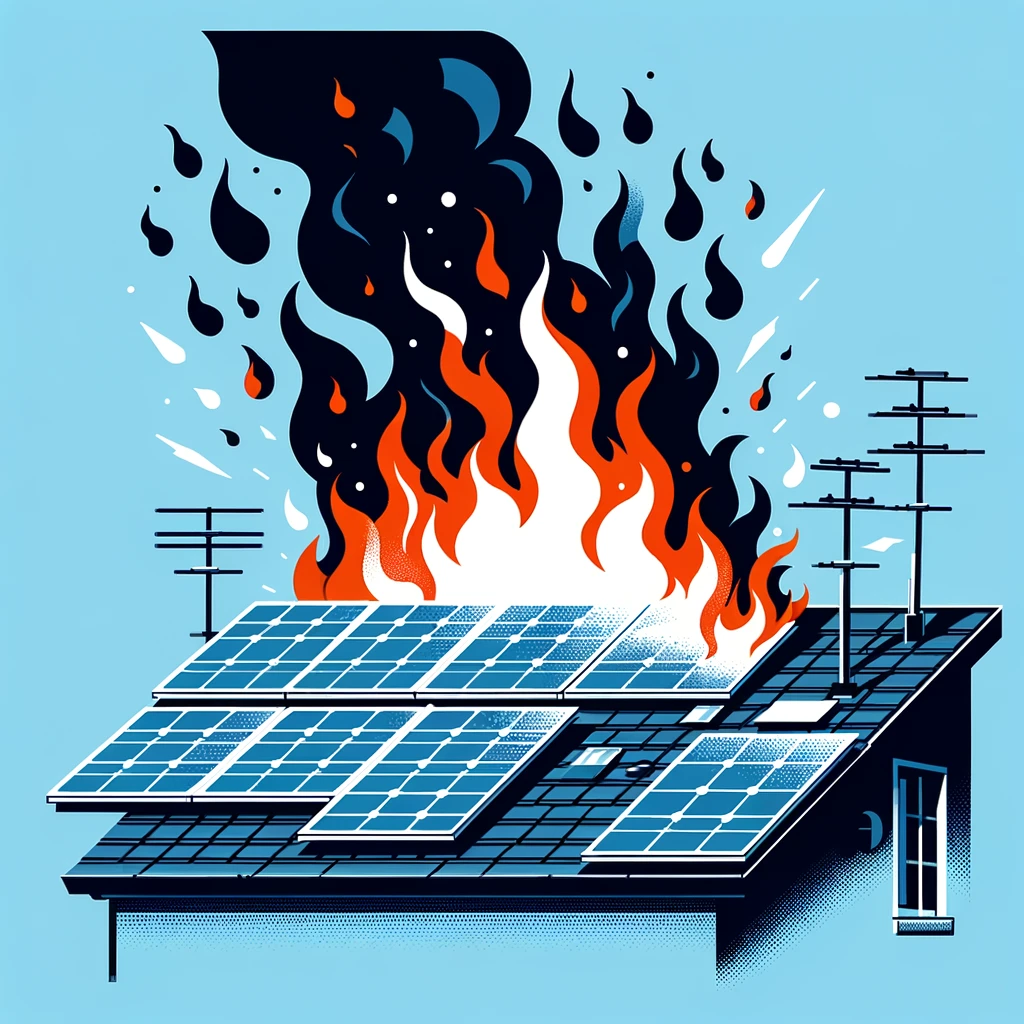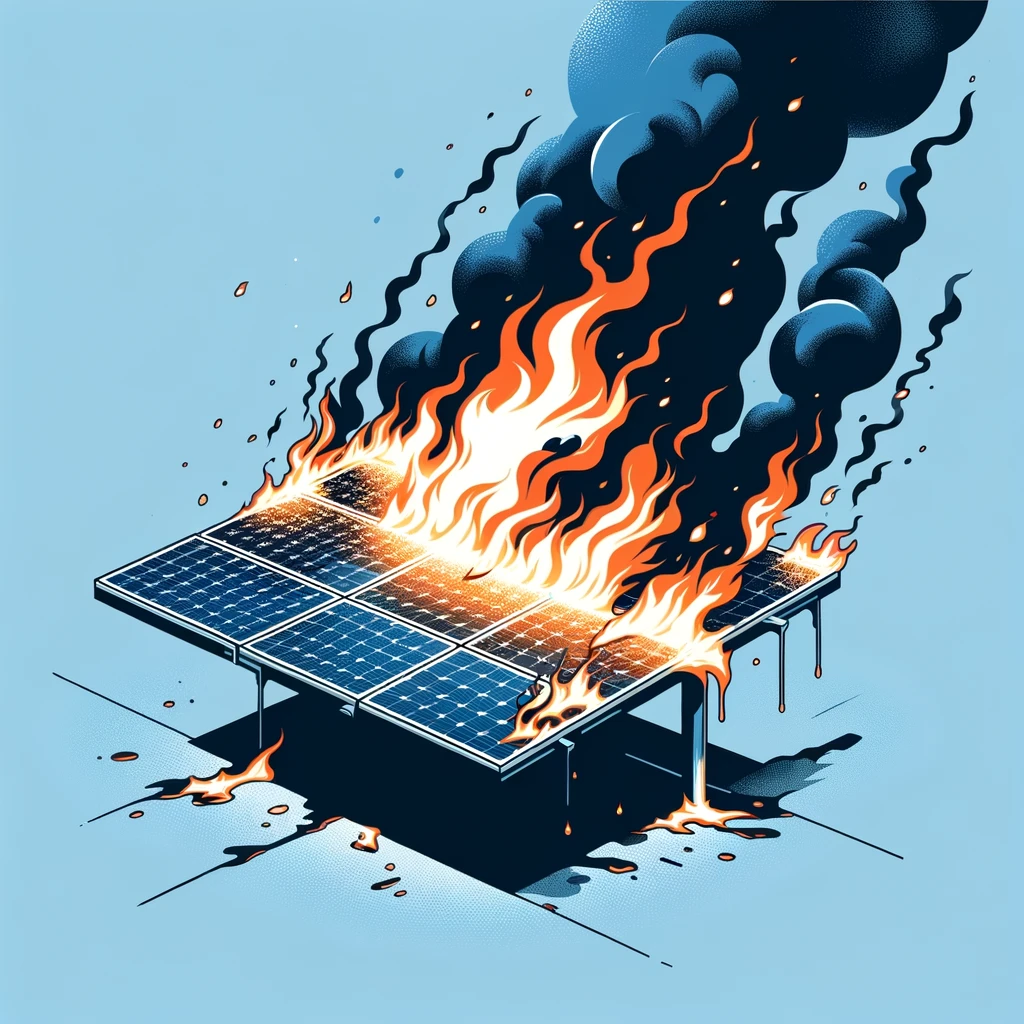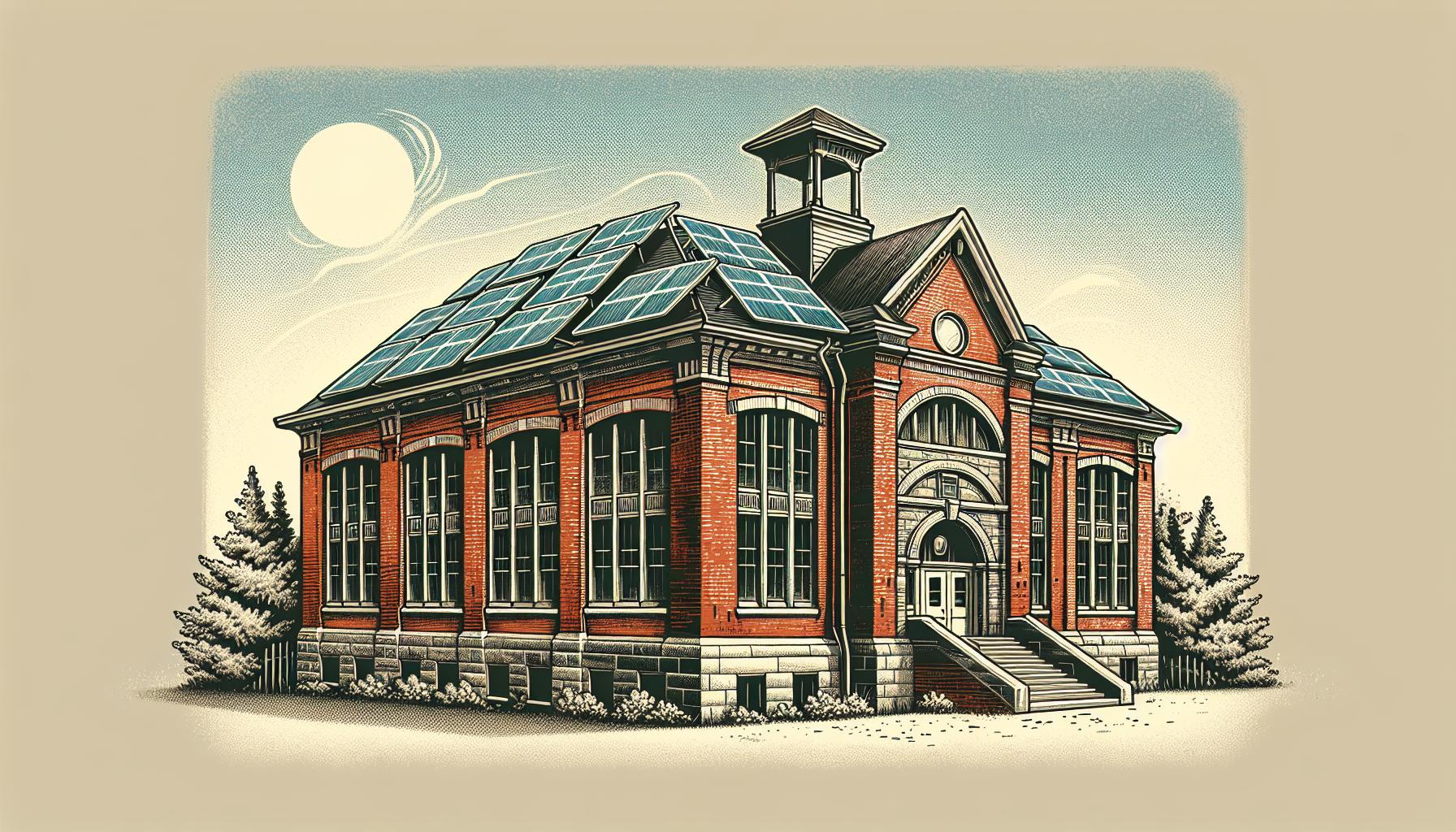Can Solar Panels Cause Fires: Burning Causes, Effects, Risk Mitigation
Are solar panels a fire hazard?
It’s a question that has sparked concern amongst many homeowners…
While solar panels themselves may not be the main culprit, there are several factors that can contribute to the risk of fires.
A few potential causes are:
- Damaged wiring
- Faulty installations
- Use of low-quality components
These are just a few of the potential causes.
In this article, we’ll jump into the reasons behind solar panel fires and provide you with essential information to ensure the safety of your solar system. So, let’s debunk the myths and shed light on the truth about solar panel fire risks.
Key Takeaways
- Solar panel fires are relatively rare, but there are several factors that can contribute to the risk, such as damaged wiring, faulty installations, and the use of low-quality components.
- Proper installation methods, including engaging certified professionals and ensuring compliance with safety guidelines, are important in minimizing fire hazards associated with solar panels.
- Regular maintenance inspections should be carried out to identify any wear and tear or signs of damage that could lead to fire risks.
- While solar panels themselves are not the main cause of fires, certain components, such as damaged wiring, faulty installations, and low-quality components, pose a fire risk if not installed correctly.
- Solar inverters have built-in safety features, but they can pose a fire risk if not installed or maintained properly.
- Solar panels themselves do not make your house hot, but proper ventilation is important to prevent heat buildup.

Burning Solar Panel Fire Question Answered
How common are solar panel fires?
Solar panel fires are relatively rare, should they occur. According to a report from Germany, out of 17 million installed solar panels, approximately 430 fires were recorded. However, it is important to note that only 210 fires were directly caused by the solar panels themselves, while the remaining incidents involved panels that were damaged as a result of other fires.
How does the electricity in solar panels work?
Solar panels generate electricity through the photovoltaic (PV) effect. When sunlight hits the semiconducting material (usually silicon) in the solar cells, it generates an electric current. This direct current (DC) is then converted into alternating current (AC) by an inverter, which is used to power your home or business.Another consideration is the roofing material. Metal roofs with solar panels are less likely to set on fire.
Potential fire risks during installation
Proper installation methods and adherence to safety guidelines are important in minimizing fire hazards associated with solar panels. The following are some potential fire risks during installation:
How are solar panels installed to avoid fires?
To avoid fires during installation, it is essential to engage certified professionals who follow industry standards. Here are some key installation practices to minimize fire risks:
- Use experienced solar installers who are CEC accredited.
- Ensure proper electrical connections and compliance with safety guidelines.
- Regularly carry out professional solar maintenance inspections to identify any wear and tear.
- Trim nearby trees to avoid shading the panels and prevent the accumulation of leaves and branches.
What parts of a solar system are the main fire risk?
While solar panels themselves are not the main cause of fires, certain components pose a fire risk if not installed correctly. The main fire risks in a solar system include:
- Damaged wiring: Faulty wiring or damaged insulation can lead to fire hazards.
- Faulty installations: Improper mounting or inadequate connections can increase the risk of fires.
- Use of low-quality components: Inferior materials can pose fire risks.
Are solar inverters a fire risk?
Solar inverters have built-in safety features that help minimize fire risks. However, like any electrical equipment, they can pose a fire risk if not installed or maintained properly.
It is essential to ensure that inverters are installed according to manufacturer guidelines and undergo regular maintenance inspections.
Do solar panels make your house hot?
Solar panels themselves do not make your house hot. In fact, they can help reduce heat by providing shade to the roof. However, it is important to ensure proper ventilation in the installation area to prevent heat buildup. This can be achieved by leaving enough space between the roof surface and the solar panels for airflow.
Remember, while solar panel fires are rare, it is important to follow proper installation methods, engage certified professionals, and conduct regular maintenance inspections to ensure the safe and effective use of solar panels.
Fire Hazards Associated with Solar Panels

Common Causes of Fires in Solar Panels
While solar panels themselves are not the main cause of fires, there are several factors that can contribute to the risk. Understanding these common causes will help you mitigate any potential fire hazards associated with solar panels:
- Damaged Wiring: Faulty or damaged wiring within the solar panel system can increase the risk of electrical faults and subsequent fires. It is important to ensure that the wiring is installed correctly and in compliance with safety guidelines.
- Faulty Installations: Improper installation practices, such as incorrect mounting or inaccurate wiring, can lead to electrical issues. Engaging certified professionals to carry out the installation is essential to minimize the risk of fire.
- Use of Low-Quality Components: Using substandard or counterfeit components can increase the likelihood of electrical faults and fires. Choosing reputable manufacturers and certified products that meet industry standards is important for the safety and reliability of your solar system.
Fire Risks During Operation and Maintenance
Solar panels pose a minimal fire risk when they are in operation and properly maintained. However, it is essential to be aware of potential fire risks during the operation and maintenance of your solar panel system:
- DC Isolators: DC isolators, used in the solar panel system, can be prone to damage due to harsh weather or water intrusion over time, leading to short circuits. Regular inspection and maintenance of the isolators are necessary to prevent any potential fire hazards.
- Electrical Wiring Faults: Faulty or damaged electrical wiring, both within the solar panels and the overall system, can increase the risk of fires. Regular maintenance inspections should include checking for any wiring faults or signs of wear and tear.
Can Washing Solar Panels Cause a Fire?
Proper cleaning and maintenance of your solar panels are important for their efficiency and longevity. However, when done incorrectly, washing solar panels can potentially lead to fire hazards:
- Improper Water Usage: Using excessive water or using water with high mineral content can cause electrical faults in the solar panel system. Follow manufacturer guidelines and use recommended cleaning solutions to ensure safe and effective cleaning.
- Electrical Contact: During the cleaning process, it is important to avoid any direct contact with electrical components to prevent the risk of electrical shocks or fires.
By understanding these potential fire hazards and taking appropriate preventive measures, you can safely and effectively harness clean energy from solar panels.
Regular maintenance inspections, proper installation methods, and the use of high-quality components are vital to ensure the long-term safety and performance of your solar panel system.
Preventing Fires in Solar Panels
When it comes to solar panels, you might be wondering if there’s such a thing as having too many. Well, the answer is both yes and no.
On one hand, having a larger solar panel system can help generate more electricity and potentially reduce your utility bills even further. However, it’s important to ensure that the system is installed and maintained properly to prevent any potential fire hazards.
Regular maintenance and inspections
One of the key factors in preventing fires in solar panels is regular maintenance and inspections. By conducting routine checks, you can identify any issues such as loose connections, damaged cables, or signs of wear and tear.
Addressing these problems promptly can prevent them from escalating into fire hazards. It’s recommended to engage professionals for thorough inspections to ensure the safety of your solar panel system.
Proper installation procedures
The importance of proper installation procedures cannot be emphasized enough when it comes to fire prevention in solar panels.
Common installation issues such as water ingress into DC isolators, loose connections at terminals or connectors, and inadequate grounding can lead to electrical malfunctions and potential fire hazards.
This is why it’s essential to engage certified and experienced professionals for the installation of your solar panel system. Their expertise ensures adherence to safety guidelines and minimizes the risk of fire.
Monitoring and controlling system operations
Another important aspect of fire prevention in solar panels is monitoring and controlling system operations. Implementing a powerful monitoring system allows you to closely track the performance of your solar system and receive alerts in case of abnormalities.
Monitoring helps identify any anomalies such as overheating or unusual electrical activity, which could indicate potential fire risks. By taking prompt action to rectify these issues, you can prevent accidents and ensure the safe and effective operation of your solar panel system.
Remember, fire prevention in solar panels is a priority. By following proper installation procedures, conducting regular inspections, and implementing monitoring systems, you can mitigate the risk of fires and enjoy the benefits of solar energy with peace of mind.
Are Solar Shingles a Fire Hazard?
Solar shingles are becoming a popular choice for homeowners looking to harness the power of solar energy while maintaining the aesthetics of their homes.
These innovative roofing materials seamlessly integrate solar panels into the structure of the roof, providing a sleek and streamlined appearance.
However, it is important to address the question:
Are solar shingles a fire hazard?
The truth is that solar shingles, like any electrical system, carry a certain level of risk when it comes to fire hazards. While the incidence of solar shingle fires is generally low, it is important to understand the potential risks and take necessary precautions to mitigate them.
One of the key factors that can contribute to fire hazards in solar shingles is improper installation. When solar shingles are not installed correctly, it can lead to issues such as electrical shorts, faulty connections, or the accumulation of moisture within the system.
These problems can increase the risk of fire and compromise the safety of your home.
Another important consideration is the quality of the components used in the solar shingle system. Using subpar or low-quality materials can increase the likelihood of electrical malfunctions and potential fire hazards.
It is important to invest in high-quality solar shingles and ensure that they are installed by certified professionals who follow proper installation procedures.
Regular maintenance and inspections play a significant role in minimizing the risk of fire hazards in solar shingles. Routine checks can help identify any signs of damage, wear, or degradation of components that could potentially lead to fire hazards.
Early detection and prompt repairs or replacements can prevent catastrophic incidents and maintain the safety and efficiency of your solar shingle system.
Additionally, it is vital to follow the manufacturer’s guidelines and recommendations for maintenance, cleaning, and operation of your solar shingles. Incorrect washing methods or direct contact with electrical components can pose fire risks.
By following the manufacturer’s instructions, you can prevent potential accidents and preserve the integrity of your solar shingle system.
While solar shingles offer numerous benefits in terms of energy efficiency and aesthetics, it is important to be aware of the potential fire hazards associated with them. By ensuring proper installation, investing in high-quality components, conducting regular maintenance and inspections, and following manufacturer guidelines, you can significantly reduce the risk of fire incidents and enjoy the benefits of solar energy with peace of mind.
Case Study: Solar Panel Fire Incident

Fires related to solar panel installations are not unheard of, and it’s important to understand the potential risks involved. Let’s take a closer look at a real-life incident to shed light on the matter.
In a recent case, a fire broke out in a school building that had solar panels installed on its roof. The incident raised concerns about the safety of solar panel systems and highlighted the importance of proper installation and ongoing maintenance.
The school had invested in solar energy as a way to reduce costs and promote sustainability. However, poor installation practices and insufficient maintenance can increase the risk of fire incidents.
Upon investigation, it was found that the fire could have been caused by loosened hardware due to severe weather conditions. High-speed winds and storms may have contributed to the damage, highlighting the need for regular inspections and maintenance after such events.
The incident serves as a reminder that even though solar panels are designed to operate safely, proper precautions must be taken to minimize potential fire hazards. This includes engaging certified professionals for installation and conducting routine checks to ensure the system’s integrity.
Furthermore, it’s important to follow manufacturer guidelines and invest in high-quality components. Cutting corners or using substandard materials can compromise the system’s safety and increase the risk of fire incidents.
While solar panel fires are not common, they do happen. The key is to be proactive in mitigating risks by implementing best practices and staying vigilant.
Regular inspections, yearly system checks, and adherence to maintenance protocols can significantly reduce the likelihood of fire incidents in solar panel installations.
Remember, your safety and the safety of those around you should always be a top priority. Taking the necessary precautions and investing in quality installations will not only protect you from potential fire hazards but also ensure the long-term reliability and efficiency of your solar panel system.
Putting Out This Fire
Now that you have a comprehensive understanding of the fire hazards associated with solar panels, it’s important to take the necessary precautions to mitigate these risks.
By following proper installation methods, engaging certified professionals, and using high-quality components, you can significantly reduce the likelihood of fire incidents.
During the operation and maintenance of your solar panel system, be vigilant about potential fire risks. Regularly inspect your system for damaged DC isolators and faulty electrical wiring. Additionally, when washing your solar panels, always refer to the manufacturer guidelines and avoid direct contact with electrical components.
The case study of the fire incident in the school building underscores the importance of ongoing maintenance and inspections, especially after severe weather conditions. By investing in regular inspections and maintenance, you can identify and address any potential issues before they escalate into a fire hazard.
Remember, the key to preventing fires in solar panel installations is to prioritize safety at every step. Engage certified professionals, follow manufacturer guidelines, and invest in high-quality components. By doing so, you can enjoy the benefits of solar energy while minimizing the risk of fire incidents.
